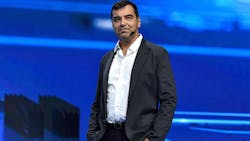Mobileye NV, the maker of chips and software for driverless cars said its cooperation with Tesla Motors Inc. won’t extend beyond the EyeQ3 product.
The Jerusalem-based Mobileye supplies cameras and technology for Tesla’s Model S sedans, including machine learning capabilities for its Autopilot suite of features. That function was at the center of a debate over the safety of driver-assist capabilities this month after Tesla said U.S. regulators were investigating a fatal accident involving a Model S that was driving on Autopilot.
Fully autonomous driving requires a “paradigm shift” in terms of complexity and the “need to ensure an extremely high level of safety,” co-founder and Chief Technology Officer Amnon Shashua told investors on a second-quarter earnings call on Tuesday.
“There is much at stake here, to Mobileye’s reputation and to the industry at large,” he said. “We think that that’s not in the interest of Mobileye to continue with Tesla in that area.”
Tesla is “not material" to Mobileye’s financial results, he said.
Musk’s Response
Tesla Chief Executive Officer Elon Musk said Mobileye’s agreements with other automakers prevent it from keeping up with Tesla’s pace of development.
“Mobileye’s ability to evolve its technology is unfortunately negatively affected by having to support hundreds of models from legacy auto companies,” the CEO said in an e-mailed statement. “This was expected and will not have any material effect on our plans.”
Mobileye will continue to support and maintain the current Autopilot program, but will not work with Tesla as it moves to fully autonomous vehicles, Shashua said on the call.
Reputation Risk
“We believe that Mobileye may be concerned about their own reputation risk with Tesla potentially trying to push the technology beyond what it was meant to do,” Joseph Spak, an analyst with RBC Capital Markets in New York, wrote in a note to clients. “We don’t believe this will portend other automakers taking similar actions.”
The software maker said July 1 it would team up with BMW AG and Intel Corp. to deliver fully autonomous cars by 2021. Short-sale interest in Mobileye has tumbled since the announcement on speculation it can establish itself as a key partner for automakers investing in driverless cars to fend off competition from Uber Technologies Inc. and Alphabet Inc.’s Google.
It has also announced partnerships with General Motors Co., Volkswagen AG and Nissan Motor Co. to develop mapping technology that gathers crowd-sourced real-time data from automakers’ fleets of vehicles.
Tensions over the crash probably catalyzed a break up that was inevitable for the two companies, said Gilad Shany, who helps oversee $26 billion, including Mobileye shares, at New York-based Baron Capital Inc.
“Both parties knew that over time they will have to part ways -- Tesla wants to fully control the experience and fully differentiate,” Shany said. “Mobileye has to work with original equipment manufacturers, it can’t have favored nations.”
The company reported second-quarter profit of 17 cents per share, surpassing the 15-cent average estimate of 16 analysts surveyed by Bloomberg, and revenue of $83.5 million that also beat the average estimate.
“Tesla’s a big marquee customer and at the forefront of autonomous technology, but the market’s acting as if Tesla’s a bigger share of their sales,” said David Leiker, an analyst at Robert W. Baird & Co. in Milwaukee. He rates the shares outperform.
About the Author
Bloomberg
Licensed content from Bloomberg, copyright 2016.
